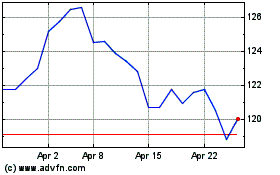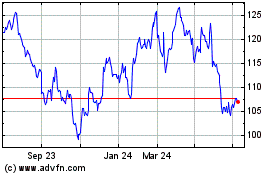By William Boston
This article is being republished as part of our daily
reproduction of WSJ.com articles that also appeared in the U.S.
print edition of The Wall Street Journal (May 16, 2020).
BERLIN -- Volkswagen AG, the world's biggest car maker, saw its
global sales shrink by almost half in April, but as coronavirus
lockdowns in the U.S. and Europe stunted demand the reopening of
China's economy offered signs of recovery.
The figures are the latest and most striking example of the
decoupling under way between the reviving Chinese market and
persistently weak demand in the West, a trend already on display in
figures from other European car makers in recent weeks.
China is ahead of the curve in responding to the pandemic. The
virus that causes Covid-19 first emerged there and Beijing was
first to reopen its economy, so its lead in resurgent auto sales
shouldn't surprise. But auto executives and analysts fear the
divergence could persist even after lockdowns are lifted across the
West, where markets are increasingly saturated and demand
pre-pandemic was already depressed.
Companies such as Volkswagen, which already made some 40% of its
sales in China before the pandemic, could find themselves even more
dependent on the Asian giant. In April, two thirds of the
Volkswagen's global vehicle sales came from China.
"We've seen two worlds in the month of April," said Jürgen
Stackmann, head of sales for the Volkswagen brand, calling China a
"bright spot."
Volkswagen said its new car sales world-wide fell to 473,500
vehicles in April from 866,400 vehicles a year ago. The biggest
declines were in South-America, mainly in Brazil, where sales fell
78%, and in Western Europe, that saw a fall of 77%. North America,
where the bulk of sales come from the U.S., had a 53% drop.
In China, already Volkswagen's largest single market, sales
totaled 305,600 vehicles, up 1% from a year ago, marking a
turnaround after three months of steep declines in the wake of the
Covid-19 outbreak.
Volkswagen's sales in China outperformed the broader Industry
last month. The China Association of Automobile Manufacturers has
previously reported that new vehicle sales rose 4.4% in April, the
first year-over-year gain in 21 months, largely driven by trucks
and commercial vehicles. Passenger car sales fell 2.6%.
Such figures expose a divergence in the industry's trajectory,
as car makers are emerging from lockdown and ramping up production
in factories around the world, China appears to be pulling out from
the worst of the slump while Europe and the U.S. are stuck in
reverse.
In a recent report, Moody's Investors Service cut its outlook
for the auto making industry, predicting a 20% decline in global
sales this year, with Europe and the U.S. facing the sharpest
falls. China was the only market for which Moody's stuck with its
forecast. April auto sales there "signals a healthy rebound in
demand," Moody's wrote.
BMW AG's CEO Oliver Zipse told shareholders on Thursday that BMW
sales in China rose 14% from year-earlier levels in April, after
falling 88% in February.
"We know from our Chinese customers that consumption there will
quickly bounce back, thanks to pent-up demand," Mr. Zipse said.
"Demand for cars in countries like Spain, Italy and the U.K. will
probably be very slow to recover. The same applies to the U.S."
In response, the industry has called on European governments to
incentivize car purchases worried that it could take years for core
European markets to recover because of weaknesses that existed
before the pandemic laid the industry low.
On top of the fallout from the lockdowns, European auto makers
are facing an aging society and structural hurdles to recovery.
Industry executives say saturated markets in Europe and the U.S.
are expected to grow more slowly than China with its lower levels
of car ownership.
For the industry as a whole, new car sales all but evaporated in
Europe last month. In the U.K., sales fell 97% to 4,321 vehicles,
the lowest level since 1946, the Society of Motor Manufacturers and
Traders, an industry lobby group, said. France and Spain, two of
the top five European car markets, reported drops of 90% and 97%
respectively. And Germany, the region's biggest auto market, saw
sales plummet 61%.
By mid-May, most of Europe's auto factories were back up and
running but well below normal capacity, with low demand proving a
bigger bottleneck than any hiccups in the supply chain.
Volkswagen said this week that its main plant in Wolfsburg,
which resumed operations at the end of April, would shut down again
for several days this month because of weak demand. Germany's
association of dealers says that up to one million unsold vehicles
were sitting on dealer lots.
European auto industry leaders met by videoconference this week
with Thierry Breton, the European Commission for the EU's single
market, to press their case for a coordinated response to boost
demand for new cars in the bloc's member states.
The European auto industry employs directly and indirectly
around 13.8 million people, accounting for 6% of all EU jobs and
11.4% of all manufacturing jobs.
European manufacturers lost around 2.4 million vehicles so far
this year due to production shutdowns, said Eric-Mark Huitema,
director general for the European Automobile Manufacturers'
Association.
"Given the near-total collapse in sales, it will be crucial to
provide a strong market stimulus to enable vehicle makers to fully
reopen production facilities and keep people in jobs," Mr. Huitema
said in a statement after the meeting with Mr. Breton.
German Economics Minister Peter Altmaier said Thursday that the
government and industry would agree on a package of measures for
the industry by early June. Auto executives are calling for a new
round of taxpayer-financed incentives -- modeled on those enacted
during the financial crisis -- to encourage consumers to trade in
old cars for new ones.
The proposal has sparked controversy because of auto industry
demands that the incentives support purchases of conventional
diesel and gasoline cars, not just the new, emissions-free electric
cars that form just a small share of their offerings.
Credit-ratings firms have downgraded the debt of some auto
makers and suppliers because of dwindling cash reserves.
Write to William Boston at william.boston@wsj.com
(END) Dow Jones Newswires
May 16, 2020 02:47 ET (06:47 GMT)
Copyright (c) 2020 Dow Jones & Company, Inc.
Volkswagen (TG:VOW3)
Historical Stock Chart
From Mar 2024 to Apr 2024

Volkswagen (TG:VOW3)
Historical Stock Chart
From Apr 2023 to Apr 2024
